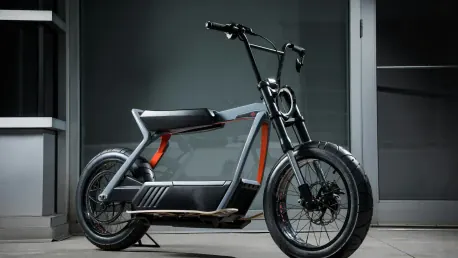Transport for London (TfL) has enacted a critical policy change that affects e-bike users across the city, spurred by pressing safety concerns. Effective March 31, non-foldable e-bikes are now banned from major transport services, including the Tube, Overground, Elizabeth line, and DLR. This decisive measure follows a comprehensive safety evaluation conducted in collaboration with the London Fire Brigade and other key stakeholders, aimed at mitigating risks and ensuring the safety of passengers and staff.
Rationale Behind the Ban
The motivation behind TfL’s decision to ban non-foldable e-bikes is rooted in recurrent safety issues primarily linked to fire hazards. While incidents of non-foldable e-bikes catching fire are relatively rare, the severity of such occurrences has necessitated urgent action. These incidents have underscored the potential dangers these bikes can pose on public transport networks. TfL’s chief priority is to minimize any possible threats, thereby maintaining a safe environment for all passengers and personnel until more robust regulatory measures and enhanced safety standards for e-bikes are in place.
Mayor Sadiq Khan has emphasized the critical importance of passenger safety in light of these infrequent yet alarming fire incidents. His decisive move to implement a comprehensive ban showcases a commitment to protecting Londoners. Concurrently, efforts are being made to collaborate with the Government and other interested parties to improve overall e-bike safety. This aligns with broader initiatives aimed at enhancing security across all facets of London’s extensive public transport system.
Insights from Safety Reviews
Lilli Matson, TfL’s Chief Safety, Health and Environment Officer, has outlined the necessity of this ban following extensive safety reviews. These evaluations drew attention to the specific hazards posed by non-foldable e-bikes, including those that have been modified with conversion kits. Such kits present unique risks, making it challenging to regulate and identify potentially dangerous e-bikes. This systemic review, carried out with the collaboration of the London Fire Brigade, highlighted the urgent need for prohibitive measures to mitigate these risks.
Supporting the ban, Charlie Pugsley, Deputy Commissioner for Prevention, Protection & Policy at the London Fire Brigade, presented compelling data on the frequency and severity of e-bike fires in London. He noted that these fires occur almost every other day and produce highly toxic smoke, making them particularly dangerous. The intensity and suddenness of these fires underline the necessity for stringent precautionary measures. Pugsley emphasized the ongoing efforts of the London Fire Brigade’s #ChargeSafe campaign, which aims to educate the public on the safe charging and storage practices for e-bikes, further supporting the rationale behind the ban.
Exceptions and Precedents
Despite the comprehensive nature of the ban, TfL has allowed exceptions for specific services where risks can be more effectively managed. For instance, non-foldable e-bikes are permitted on the Woolwich Ferry, various river services subject to operator approval, coach services also contingent on operator consent, and the forthcoming Silvertown Tunnel Cycle Shuttle Service. These exceptions highlight TfL’s effort to balance safety concerns with service flexibility in controlled environments.
This policy update is consistent with TfL’s 2021 ban on e-scooters, implemented due to similar fire risks. The approach taken by TfL aligns with similar actions by other train companies, reflecting a unified stance on the potential fire hazards presented by these devices. This uniformity in addressing safety concerns emphasizes the serious attention given to passenger safety within public transport networks, demonstrating a commitment to proactive risk management.
Enforcement Details
Enforcing the new policy will be rigorous to ensure comprehensive compliance. TfL officers are authorized to refuse entry to individuals attempting to bring non-foldable e-bikes onto restricted transport modes. They can also direct individuals to exit and issue fines of up to £1,000 for violations. These stringent enforcement measures prioritize the safety of all passengers using London’s public transportation system, ensuring that convenience does not compromise safety.
Ultimately, TfL’s proactive stance in banning non-foldable e-bikes underscores the imperative of balancing transportation innovation with stringent safety protocols. This action demonstrates the organization’s dedication to preventing potential disasters while working towards better safety standards in collaboration with governmental and industry stakeholders. The overarching trend within transport networks reflects a growing recognition of the need to adapt safety policies in tangent with emerging transportation technologies.
Future Considerations
Transport for London (TfL) has implemented a significant policy change affecting e-bike users citywide, driven by crucial safety concerns. Beginning March 31, non-foldable e-bikes are prohibited on major transport services, including the Tube, Overground, Elizabeth line, and the Docklands Light Railway (DLR). This major decision stems from an extensive safety analysis conducted in partnership with the London Fire Brigade and other vital stakeholders. The primary goal is to reduce risks and safeguard the well-being of both passengers and staff. The collaborative evaluation involved meticulous consideration of potential hazards posed by non-foldable e-bikes, ultimately leading to this preventative measure to enhance public safety on London’s public transport network. This policy reflects TfL’s ongoing commitment to maintaining a secure environment for everyone using these services. As safety remains paramount, the ban underscores the importance of proactive measures in urban transportation.









